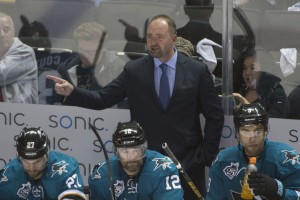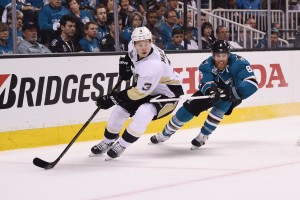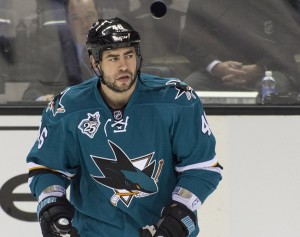Patience is a virtue, according to a famous saying. San Jose Sharks head coach Peter DeBoer showed how patience can be a virtue over the course of the 82-game regular season. The virtue may have turned vice in the team’s last six games, their trip to the Stanley Cup Final.

Prior to Game 5, DeBoer stated, “There’s a saying that you dance with the girl you brought to the dance. I think that’s going to probably be our approach here going forward.”
The Sharks had problems in the Stanley Cup Final. It was very different from all the Sharks’ prior rounds. To run with the dancing metaphor, if the series against the Los Angeles Kings, Nashville Predators and St. Louis Blues were each a different sort of dance, the Final against the Pittsburgh Penguins was more akin to a tax audit. The girl you take to the dance probably isn’t the same one you want with you when authorities are pouring over your tax filings. For DeBoer, changes needed to happen early in the series, perhaps even before the series.
Over the course of the season, DeBoer made plenty of changes, but they came slowly and mostly organically. There was about one adjustment per month, so as not to throw too many changes all at once. DeBoer’s approach worked effectively for an 82-game season. It worked into the playoffs against familiar opponents playing familiar styles. It is not the same approach needed for a seven-game series against an unfamiliar opponent playing a very different style. The Penguins took the first two games of the series and while the Sharks battled gamely, the hole was already deep.
The Adjustments
The adjustment possibilities were numerous. DeBoer made modest adjustments, primarily line juggling on the second and third lines, along with some bench shortening. In order to match up with Pittsburgh, something more radical could have been tried. I’ve listed some of them here.

Split up Joe Thornton and Joe Pavelski: The argument is they were not effective together, splitting them makes it harder for Pittsburgh to focus on the one line. By upgrading other lines, it might have freed one player or the other to contribute more offensively.
Move Brent Burns to forward: The argument is Burns was effective on defense, but he struggled to get his point shot through, a focal point for the Sharks offense. He was effective playing down low where forwards normally roam. Two of his three even-strength points, including his lone goal, came on sequences where he had the puck behind the net (his other point came with him positioned defensively where a forward usually plays). Pittsburgh figured out how to match up with Burns at the point. Down low, they couldn’t handle him. Adding credence to the argument, Pittsburgh had trouble handling Tomas Hertl (prior to his injury late in Game 2). Hertl is among San Jose’s bigger, most physical forwards. Burns is bigger and more physical than Hertl. Burns’ forecheck, among the best in hockey when he played forward, might also have helped.

Replace Roman Polak with Dylan DeMelo: Polak and defensive partner Brenden Dillon are similar players, sharing the same exploitable weakness: the inability to get pucks cleanly out of their defensive zone. A weakness Pittsburgh exploited with great frequency. DeMelo, a rookie, showed he was a good complement to Dillon in the regular season. Having not played in two months meant a lineup change with DeMelo would be risky. Not making a change, though, was also risky. A related adjustment with a similar aim would have severely reduced the minutes of Polak and Dillon, essentially using a four-defenseman strategy. Polak finished the series minus-3, his ice time per game increased from the prior series against St. Louis. It is worth noting some (myself among them) expressed concerns over this specific vulnerability before the series began.
Change the Power Play: The Sharks’ power play was anemic. Its only goal came on the first power play of the series, the next 10 all failed (an eleventh came in the final seconds of Game 6). DeBoer could have attempted a variety of things. A new entry might have helped. Starting the second unit at the start of the PP might also have been a helpful twist. Though the personnel are different, the Capitals had power-play success in their series against Pittsburgh (22 percent). Perhaps borrowing from their playbook might have helped the Sharks.
Move Patrick Marleau to third line center: The veteran did not score in the series after his goal in the first game. All series long, the Sharks found themselves struggling to match the Penguins’ speed and depth. Moving Marleau would have been a chemistry move. Marleau’s move to the third line had the potential to make both the second and third line better. Certainly he did not have enough success on the line with San Jose’s most effective forward, Logan Couture. Some interesting thoughts on Marleau’s game and his future can be found in this podcast by Paul Gackle.
The Hindsight Game
It is possible none of these adjustments would have created a better result. Some may have created a worse result. But really, is there a major difference between losing a Stanley Cup Final in six games versus losing in five or four? Those were the risks.
The Sharks attempted to match Pittsburgh using the same core tactics which worked well in the prior three series. DeBoer publicly said he felt the series was close. The score is what matters when determining a winner. The score agreed with DeBoer, it was a close series. Each of the six games were close with three minutes left in regulation: three were tied, Pittsburgh led by a goal twice, San Jose led by a goal once. The only reason for ‘close’ though, was Sharks goalie Martin Jones. DeBoer described Jones play as “sensational.” When sensational gets just two wins and four losses, there is a problem elsewhere.
http://gty.im/539758938
DeBoer’s actions, or lack thereof, suggested he paid more attention to the scoreboard version of the series, less to the play-on-the-ice version.
Hindsight is a wonderful thing. It has the virtue of never having to be right because it can never be tested. Would any of the changes made a difference? We can never know, making the comparison inherently unfair to a coach who led his team to a highly successful season. Also, life isn’t fair and future trips to the Stanley Cup Final are not guaranteed.
Business guru James Collins describes good as the enemy of great. The Sharks were good enough to hang around with Pittsburgh, but chose not to take the risks which might have resulted in greatness.
San Jose’s ‘business as usual’ game plan did not work out. The risk of making major changes seems substantial, up until the point where one recognizes there is little to lose. This Sharks team entered the final period of their season trailing 2-1. In the period, they managed only two shots on goal. Pittsburgh had the formula to beat San Jose as long as the Sharks stuck with the same plan. Perhaps there is some sort of dignity in losing four close games and winning twice. Perhaps there is dignity in sticking with the girl who brought you to the dance. But if there is little to be gained by losing, the downside of making changes was essentially zero. Hindsight, however unfair, makes it clear.
The irony which underlies this can be found in the work of Pittsburgh coach Mike Sullivan. Sullivan took over Pittsburgh 28 games into the season and immediately, fearlessly, went for major change. In hindsight, Sullivan’s downside was minimal, his upside was hockey’s greatest glory. It all looks very bold, but there was also little downside. The absence of downside provided freedom to make the necessary changes. If Pittsburgh had just a few more wins in their first 28 games, the coaching change and the greatness it enabled probably never happens.
Did DeBoer’s patience, which proved a virtue for the Sharks first 100 games, betray the team in its final six? We’ll never know.
Zeke’s Notes
For the second time in his career, DeBoer coached his team to the playoffs. Both times, he coached his team all the way to the Stanley Cup Final. And both times, lost to a team coached by a midseason replacement. When DeBoer was with the New Jersey Devils, he coached in the Final against Darryl Sutter, a midseason replacement for the Los Angeles Kings.